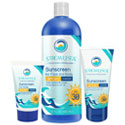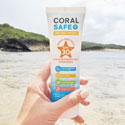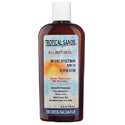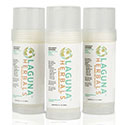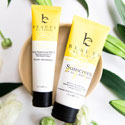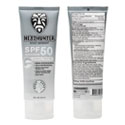|
If you visit anywhere in the
Riviera Maya, including Cancun or Playa del Carmen,
or even Cozumel, you'll need to come armed with
Biodegradable Sunscreen. This is the
only type of sunscreen that you can use in
this area of Mexico, in an effort to preserve the
beautiful coral reefs. Please respect these
regulations, and pick up some Coral Reef Friendly
Sunblock before coming to Playa del Carmen.
Only biodegradable suntan lotions and sunscreens
can be used inside Xcaret or Xel Ha as well, and
they'll usually confiscate any regular chemical
or oil-bases sunscreens upon sight.
Information regarding eco-friendly
sunscreens is not readily available so we've tried
to make it simple for you here. If you have
any questions at all about biodegradable products,
just
E-mail
us, we're happy to help.
ANSWERING THE BASIC QUESTIONS:
Q: What is biodegradable sunscreen?
A: Most commercially available sun
blocks are packed full of chemicals and oils that
damage the ecosystem and destroy coral reefs.
A few select products are engineered with not only
coral reefs, but also your health in mind.
They use only natural products that naturally break
down, so they minimize damage to the environment.
They also lack chemicals and oils that poison the
reefs or promote viral infections, instead using
natural ingredients that are found anyway in sea
water.
Q: How do I know if my sunscreen
is biodegradable?
A: If it doesn't say it is on the package
then it isn't. None of the major brands are
biodegradable - such as Coppertone, Banana Boat,
No-Ad, etc.
Q: As long as my sunblock
says biodegradable is it OK?
A: Not necessarily. Many biodegradable
suntan lotions use chemical UV blockers which have
been shown to be harmful to the environment.
Some products even say they're marine friendly but
still contain ingredients shown to cause coral bleaching
and destruction of the reefs. Also make sure
that your sunscreen says "Waterproof" so it won't
wash off in the water, further minimizing it's impact
on the reefs.
See Chart
Q: Are there certain ingredients
to watch out for?
A: Some of the common UV Blockers are
PABA, Octinoxate, Oxybenzone, 4-methylbenzylidene
camphor and the preservative butylparaben.
Don't use anything that contains these ingredients
in the water. We recommend products using
Zinc Oxide or Titanium Dioxide instead - these minerals
are naturally occurring in sea water, and are not
chemicals. See our list of harmful ingredients
in the lower right - check these against your sunscreen
label to see if it's reef-friendly. If these
are on your label, then your sunscreen is not reef-friendly
and may be confiscated at Xel Ha or Xcaret.
Q: What kind of damage does
sunscreen do to the marine ecosystem?
A: Sunscreens worn by millions of tourists
washes off in the water, over 4,000 tons of it ever
year, and settles in big oil slicks which suffocate
the reefs. Also, chemicals they contain cause
viral infection in the coral, which leads to bleaching
and kills the coral. As much as 25% of the
world's coral reefs are in imminent danger of collapse
due to human pressures, and another 25% is in longer
term danger. Oxybenzone, a common sunscreen
ingredient, has even been shown to feminize fish.
Q: Where can I buy
Biodegradable Reef-Friendly Items?
A: We've provided some links for you
at right. You might be able to find them at
a local health food store but usually not at your
local drugstore or Wal-Mart. We like to recommend
Stream 2 Sea because it says "Ecoconscious - Biodegradable", so you won't run into trouble at Xcaret
or Xel Ha.
Q: I've never heard of this
before. Are you making this stuff up?
A: See the links below for the latest information.
Search Google for tons more references.
ABC News:
Sunscreen Accelerating Demise of Coral Reefs
SaveTheReef.org:
About Reef Saving Sunscreen
National Parks Service:
Protect Yourself & Protect the Reef
Sierra Club:
Your Sunscreen is Destroying Reefs
Sustainable Travel International:
Safe Sunscreen Coral Reefs
|

